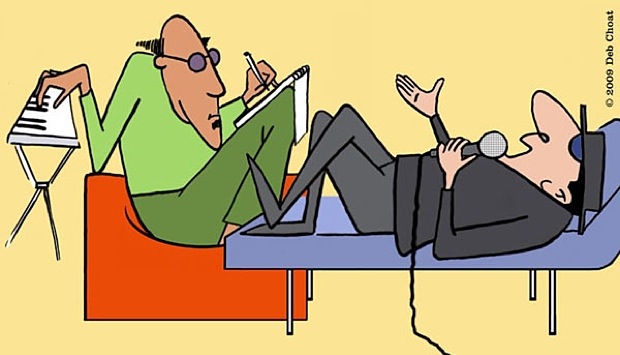Home » Jazz Articles » Mr. P.C.'s Guide to Jazz Etiquette and Bandstand Decorum » Best of 2012
Best of 2012

I've noticed that when a lot of the younger groups rearrange a standard or pop song, they take out a beat here and there. It keeps me off guard and if I don't count I lose track of the downbeat. But that's fine. What I'm wondering is: Where do those beats go?
Beats Are Missing
Dear BAM:
It's horrible to say, but this is simply the thinning of the species; natural selection favoring the beats that matter most, at the expense of those proven to be expendable. Oh, to believe in Intelligent Design, that benevolent fairy tale glossing over the destruction of the weak and defenseless! But, no, my belief system offers no such consolation; these superfluous beats will someday be entirely extinct, thoughtlessly offed by young composers yet to develop a musical conscience.
What does this mean for the future of jazz? 4/4 time will no longer be the standard; first 3/4, then 2/4 will eventually rise to the fore, with sporadic dropped beats continuing to mark the music's evolution. The brutal process will continue until there's just one beat left; a powerful and utterly adaptable beat, granted, but one that in itself will appeal to only the cruelest and most simpleminded among us. Which, conveniently, may be the only humans left by then anyway.
Dear Mr. P.C.:
My group was playing in a remote South American town for people who had never heard jazz before. We were billed as a jazz trio, and after the show one of the audience members asked me, "Who is Jazz?" What should I have said?
Howard In The Tropics
Dear HINT:
Jazz is slippery. It carries no passport or credit cards, and refuses to reveal its name at hotel check-in. Hiding from authorities, it can take on any physical form it chooses—from trumpeter Wynton Marsalis to saxophonistJohn Zorn, from guitarist Pat Metheny to saxophonist Kenny G. Its diet is high in alcohol and THC, and it often smells rank. Jazz has no fixed name; it's a psychopath, changing identities faster than you can say "harmolodic funk."
So who is jazz? For the time being, apparently, it's my next door neighbor Bill, a surly tugboat captain who keeps building weird additions to his house. Go figure.
Dear Mr. P.C.:
When people use big words to describe their music, is that supposed to make it better? Like I know a bassist who says he's "contextualizing" his music. Why does he do that?
Bassist Uses Lofty Language
Dear BULL:
He's practicing Grantspeak, of course. A few decades ago, granting agencies grudgingly started funding jazz projects. But how can their panelists judge the applications when they know nothing about jazz music?
Well, what they are comfortable judging is intellect, so they depend on jazz artists to put it on full display. That's why savvy applicants like your bassist friend keep their eye on the prize and practice at every opportunity. In fact, if you'd stuck around a little longer you might have even seen him go from contextualizing to "re- contextualizing." Extra credit!
Although grantors were the original targets of Grantspeak, its use has become more widespread. Other people in positions of power in the jazz world—especially presenters and journalists—have proven equally susceptible to its charms. And it's even starting to influence artists, not only in their music, but also in their interactions:
Andrew: Hey, Bob, what's happening?
Bob: You know, just shedding, trying to keep my chops up. How about you?
Andrew: Actually, in my new multidisciplinary song cycle, based on a contemporary reading of recovered scripts from the earliest matriarchal societies, I'm reexamining the relationship between soloist and ensemble, looking for ways to evoke a more egalitarian, communal paradigm.
Bob [embarrassed]: Cool. Um, guess I'll go practice Stablemates.
Andrew [silently]: "Heh, heh, heh."
People ask where jazz is heading, BULL, and I can answer definitively: Grantspeak is the future! Not only as a descriptive language, but as a quasi- paradigmatic, non-idiomatic re-contextualization of jazz itself. Buy your thesaurus now, before you and your music are left behind!
Dear Mr. P.C.:
At the end of my gig, the bandleader told me that my playing is "timeless." Is that good?
Drummer in Doubt
Dear DID:
Does he pay you by the hour? If so, he may be trying to pull a quick one on you. Think about it: If you've just played a gig from 9:00 to midnight, you'd expect him to pay you for the three hours you put in. But by calling your playing "timeless," he can pay whatever he wants—if anything.
Historically, this has happened to drummers more than to any other musicians. That's how they became timekeepers; first for themselves, and eventually for the entire band. Unfortunately, being responsible for tracking everyone's billable hours carries a lot of pressure with it. That has taken a harsh toll on drummers' playing, causing them to rush and/or drag unpredictably.
It's a vicious cycle: drummers, distracted by their timekeeping duties, can rush or drag so badly that a three-hour gig feels like six hours to all the other band members. So the musicians want to be paid for six hours, and the leader wants to pay for just one. Stuck in the middle, the poor hapless drummer can't keep time to anyone's satisfaction, and the stress only makes him rush and drag even more.
Dear Mr. P.C.:
I just went on YouTube and found out there's a really crappy video of me playing with some lame musicians. I got pretty upset. Is there really nothing I can do about it? Fred T., Boston
Dear Fred:
Of course there's something you can do about being upset—just stop dwelling on the negative, and pay a visit to your happy place!
Mine is the memory of a very special moment early in my career. I was playing a solo gig as a volunteer at the local psychiatric institution when a middle-aged woman ran into the room, her mouth sealed by duct tape. She sat close to me on the piano bench, fragrant with medication, and began furiously attempting to sing. Duct tape isn't shed easily, but she was so moved by my playing that one side of her mouth eventually broke free. It turned out that she was improvising her own lyrics, a combination of the Gettysburg Address and the Book of Job. I went right there with her, bursting into passionate free improvisation that became her underscore.
Before I knew it, she tried to kiss me, and her mouth got stuck to the side of my face. It was the first time I'd ever seduced a woman with my playing, and I realized I was blessed with a powerful gift; one that I was obliged to share with man/womankind. I didn't even mind our eventual painful separation, though it did rip a layer of skin from my cheek.
How strange and enchanting that the two of us, both destined for groundbreaking careers, should meet in this chance encounter! I, of course, parlayed my interests in psychology and music to become the doctor so many of you depend on. She headed east with her duct tape, took the stage name of Thorazine, and was the toast of New York's performance art community before a rehearsal mishap led to her untimely death by suffocation.
Dear Mr. P.C.:
Now that so many people have smart phones, there's no more conversation with my band mates on our breaks. Each guy just starts texting, or surfing the net, or playing his favorite app.
It used to be that "the hang" was one of the best things about gigs, but now it doesn't exist, because there's no one to talk to. Everyone's in his own separate cyber world, and it makes me really sad.
What am I supposed to do on my break now that the hang is gone?
Apps Leave One No Entry
Dear ALONE:
There's an app for that! With iHang, you can hang with anyone you want, anywhere, anytime! Lonely on break? Ditch the game geeks in your band and spend time with people who share your love of social interaction.
When your break ends, iHang is just beginning! Up on the bandstand, mid-tune, you can pretend to be reading chord changes from the iBook, while in reality you're hanging with friends—even other guys in other bands, in the middle of other tunes! What could be better?
Once you tell your tech-savvy band mates about iHang, they'll be all over it! Soon you'll be hanging with them more than ever—on your break and on the bandstand; before, after and during tunes. You'll happily say farewell to those archaic analog days you've been longing for.
iHang: Better than being there!
Have a question for Mr. P.C.? Ask Mr. P.C.
< Previous
Jacqui Sutton: At the Edge of the Fro...
Next >
Stories, Tales and Songs
Comments
Tags
Mr. P.C.'s Guide to Jazz Etiquette...
Mr. P.C.
United States
New York
New York City
wynton marsalis
john zorn
pat metheny
Kenny G
For the Love of Jazz
 All About Jazz has been a pillar of jazz since 1995, championing it as an art form and, more importantly, supporting the musicians who create it. Our enduring commitment has made "AAJ" one of the most culturally important websites of its kind, read by hundreds of thousands of fans, musicians and industry figures every month.
All About Jazz has been a pillar of jazz since 1995, championing it as an art form and, more importantly, supporting the musicians who create it. Our enduring commitment has made "AAJ" one of the most culturally important websites of its kind, read by hundreds of thousands of fans, musicians and industry figures every month.




















